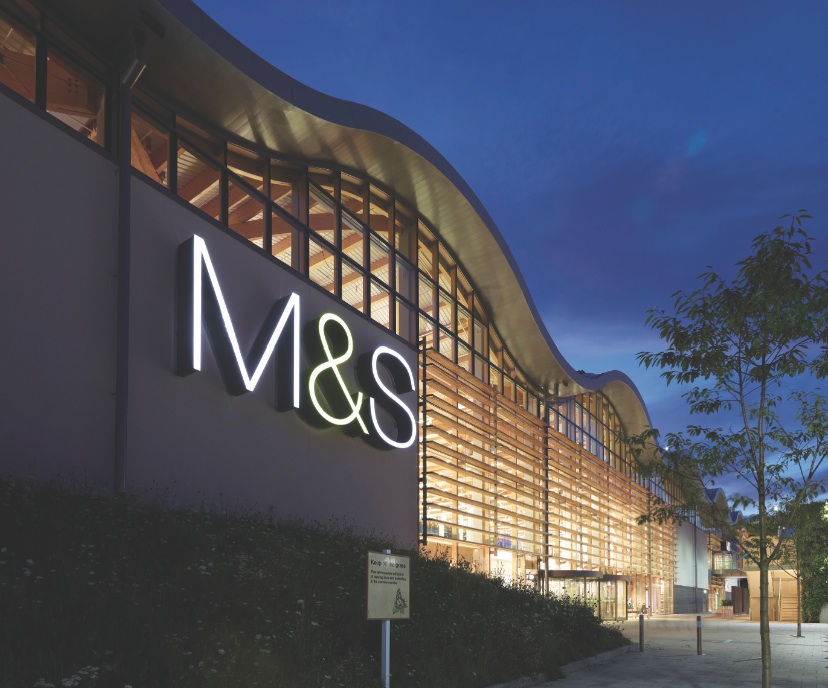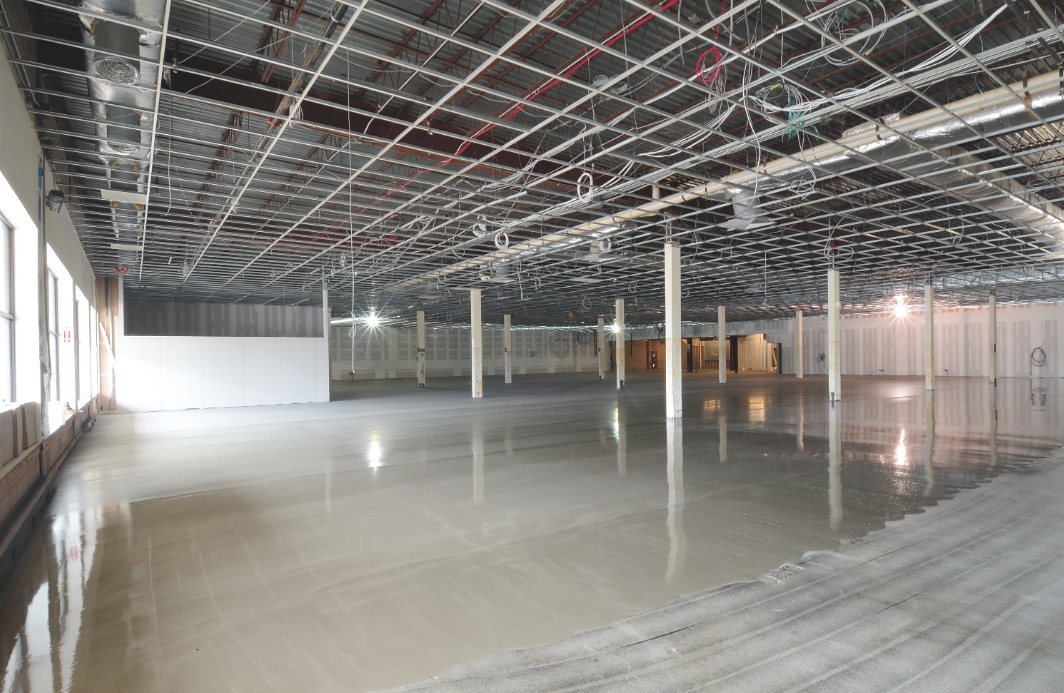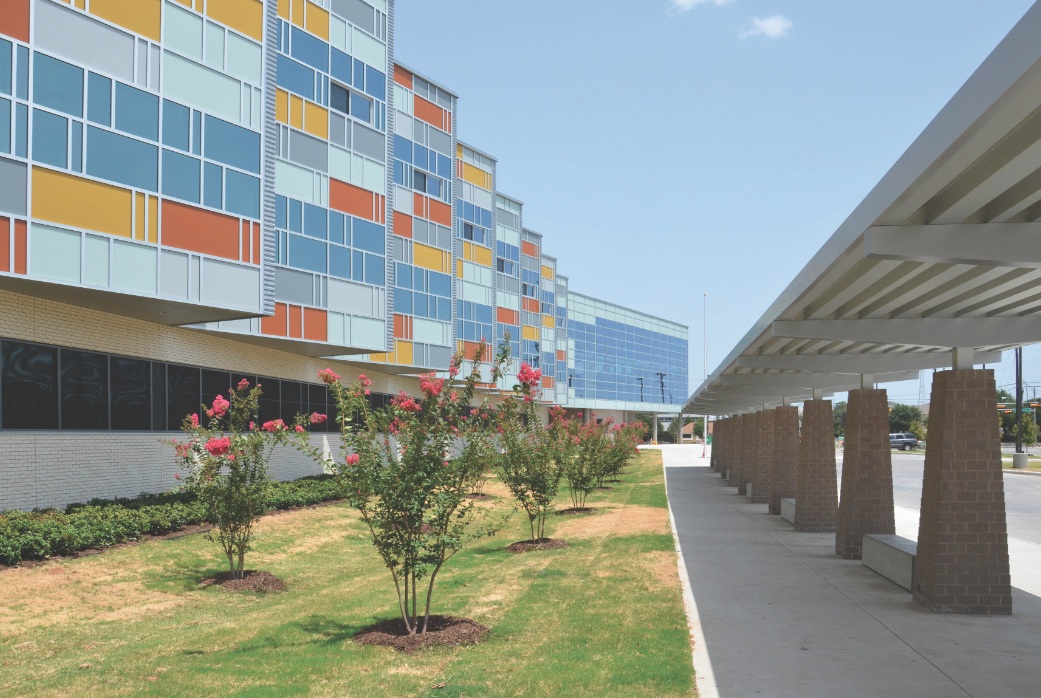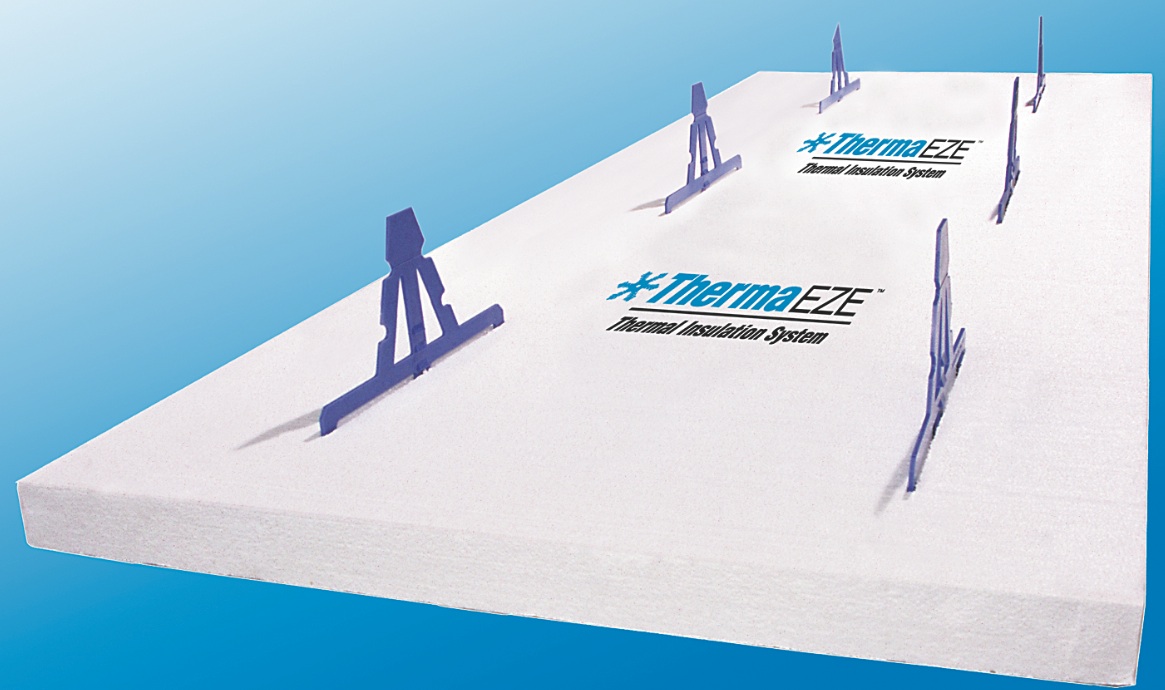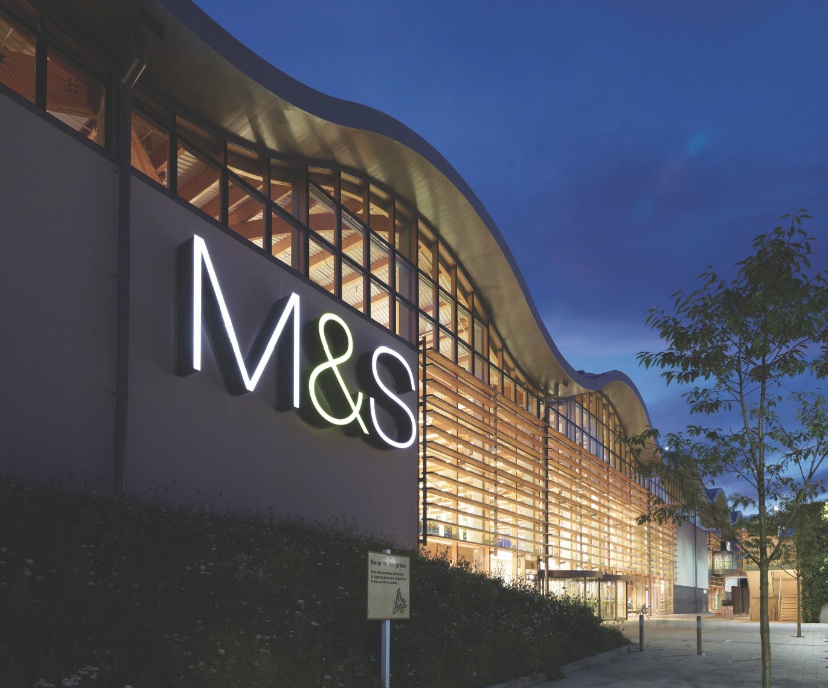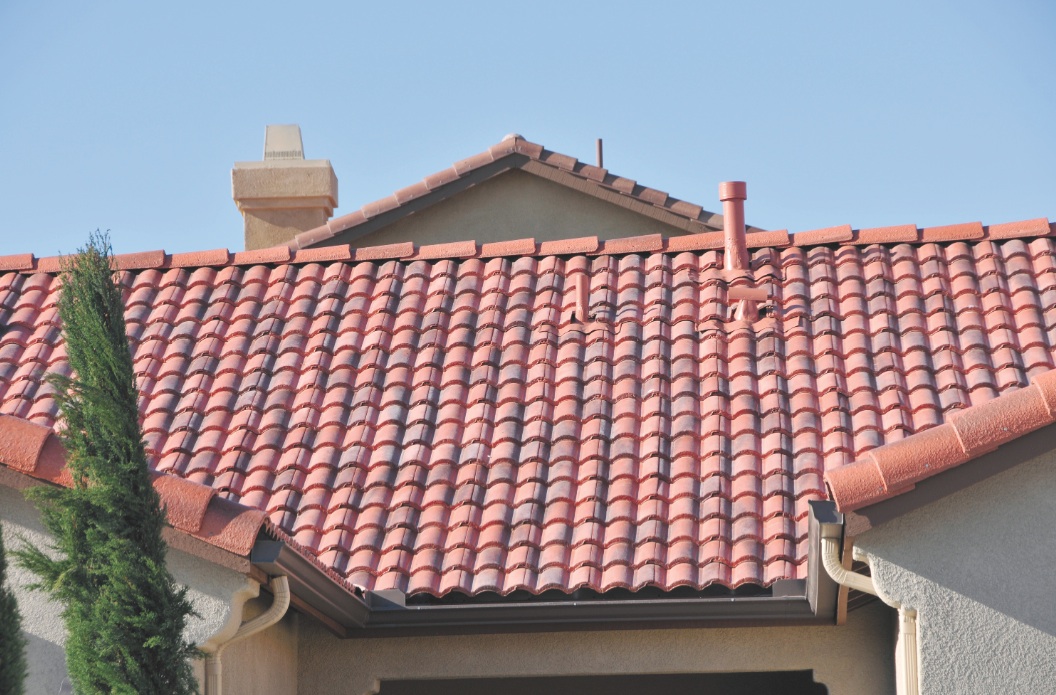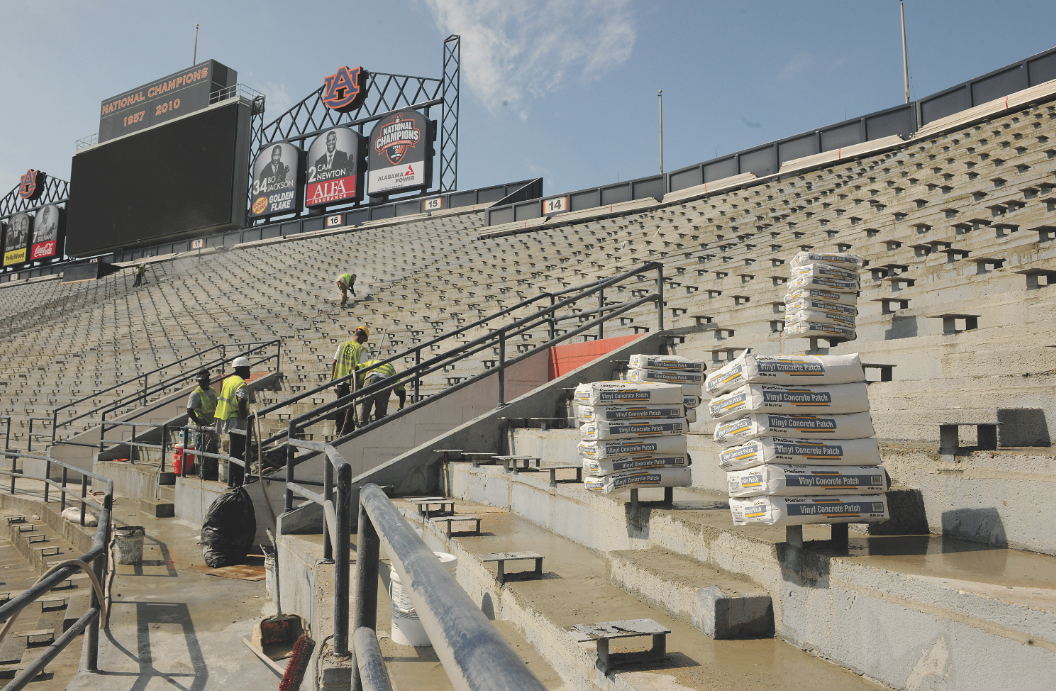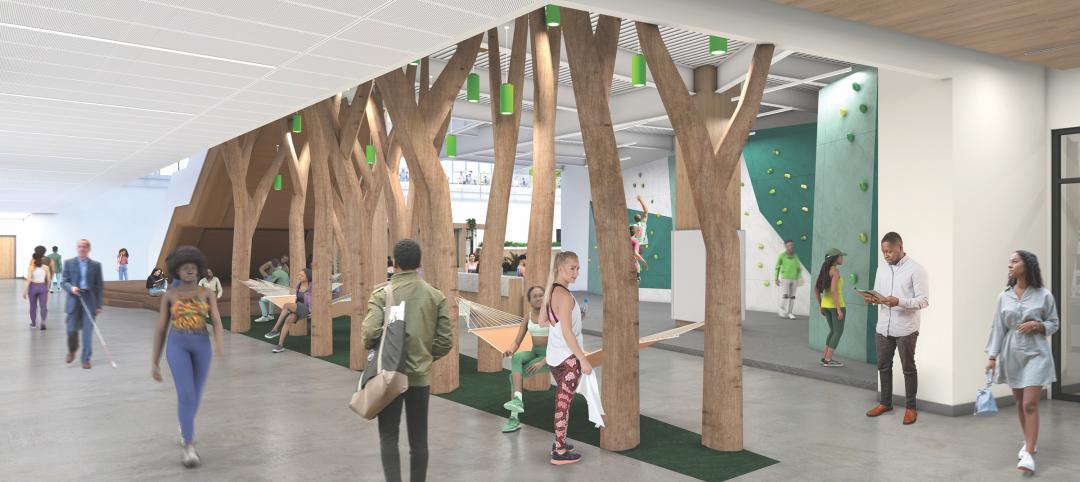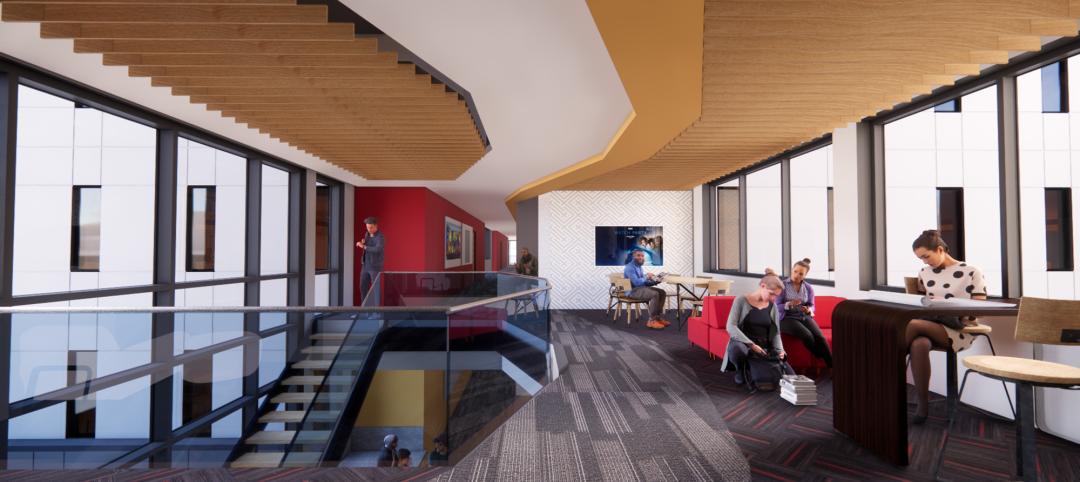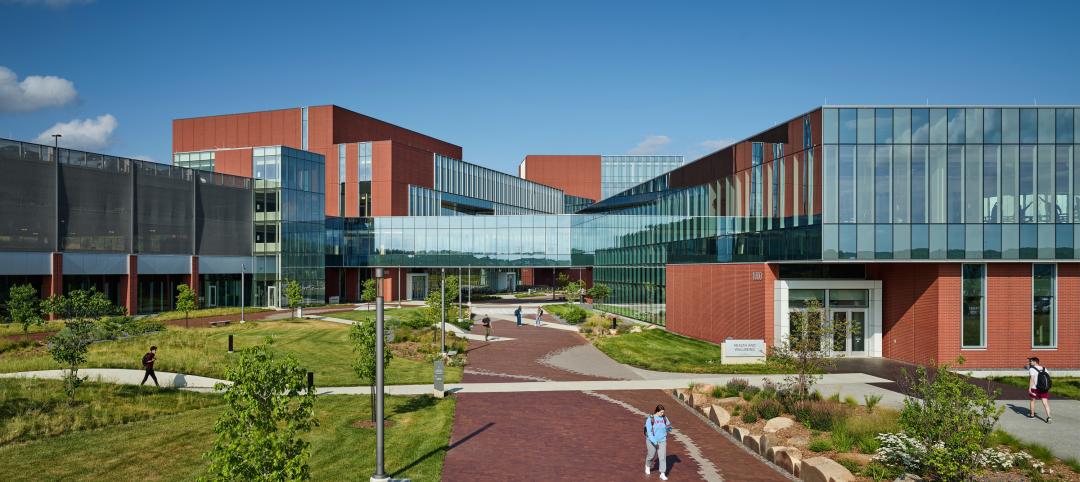1. UNDERLAYMENT SYSTEM DESIGNED TO SAVE TIME, MONEY ON SLAB WORK
Swedish Hospital and Medical Office Building, Issaquah, Wash., is a 600,000-sf campus developed by Hammes Company, with architect Collins Woerman and contractor Sellen Construction leading the Building Team. The project was completed ahead of schedule and nearly $35 million under budget through a combination of methods, including heavy use of Lean principles, BIM, and integrated delivery. One result of the teamwork was the choice of the SUPERCAP system to cap the concrete base slab, instead of using a traditional trowel-applied finish. The system combines a Greenguard-certified, low-alkali, self-leveling cement-base technology with a computer-controlled pump truck. At Swedish Hospital, the system eliminated concerns about flatness inherent to concrete slab work with structural steel buildings. Sellen placed about 20,000 sf/day of concrete, compared with 15,000 sf/day using conventional troweling. LATICRETE
2. TEXAS STUDENTS MOVE IN FASTER WITH RAPID-DRYING CONCRETE
The original schedule for Billy Earl Dade Middle School, a replacement school for the Dallas Independent School District, called for a 14-month construction period. When officials asked that the schedule be cut to 10 months so students could move in for the fall 2013 term, the Building Team knew concrete drying posed a potential problem. Aridus Rapid Drying Concrete, a ready-mix formulated to help prevent moisture-related flooring failures, was selected for its combination of fast drying time, high early strength, compressive strength, and low permeability. The project required 20,000 cubic yards of concrete, including 5,000 cubic yards of Aridus used to cover 120,000 sf of floors. Crews were able to install final flooring 21 days after the concrete was poured, compared with a typical drying time of at least four months. On the Building Team: Satterfield & Pontikes Construction (GC), Redi-Mix Concrete (concrete supplier), and KAI Texas (architect). U.S. Concrete
3. THERMAL INSULATION SYSTEM TAILORED TO POURED CONCRETE WALL CONSTRUCTION
ThermaEZE thermal insulation works with poured concrete walls—including foundation walls—for better insulation than conventional poured concrete, according to the manufacturer. The system consists of panels of expanded polystyrene foam, placed within the wall forms before the pour and held in place by a patented web structure that becomes embedded in the concrete. The resulting walls thus consist of a concrete layer and an attached insulation panel, with fastening strips on the exposed face to facilitate application of drywall or other finish materials. Depending on the thickness of the concrete, R-values range from 9.6 to 11.7. Panels are termite-resistant, odor-free, and contain no CFCs, HCFCs, HFCs, or formaldehyde. The UL-approved system is IECC code-compliant for foundation walls, and meets ASTM C578 Type 1 and ICC-ES EG239 requirements for below-grade use. North American Specialty Products
4. OPTIMIZATION SERVICE ADDS GREEN SPIN TO ONE WORLD TRADE CENTER CONSTRUCTION
In addition to sending a symbolic message of strength and freedom, One World Trade Center in New York City was designed to be an example of sustainability. The Port Authority of New York/New Jersey imposed strict requirements, including replacing a high percentage of portland cement with recycled materials. BASF Construction Chemicals’ Green Sense optimization service helped the Building Team, including concrete contractor Collavino Construction and concrete producer Eastern Concrete Materials, create mixes with appropriate compressive strength for the 1,776-foot skyscraper. The mix replaced 71% of the portland cement that would have been required in a conventional mix with recycled materials, non-cementitious fillers, and specialized admixtures to exceed performance targets specified by the stakeholders. The first 40 floors required 38,000 cubic yards of a special mix, providing compressive strength of at least 12,000 psi. BASF estimates that 25.4 million in kWh savings will be produced over the project’s life cycle in connection with the mix, as well as reductions in fossil fuel and greenhouse gas production, rain acidification potential, water, and solid waste. BASF Corporation
5. BIO-BASED COMPOSITE COMBINES HEMP AND LIME FOR HIGH PERFORMANCE
Tradical Hemcrete, developed in the U.K. by Lime Technology, incorporates hemp shiv (the woody core of industrial hemp) and a lime-based binder, Tradical HB. The resulting composite exhibits good thermal insulation and excellent thermal inertia, according to the manufacturer, creating environments that need minimal heating or cooling. The material has negative embodied carbon because CO2 that is captured by hemp as it grows is ultimately sequestered within the Hemcrete. Several design and construction methods are appropriate, including direct application to timber-framed structures and use with a rainscreen system. Because proper on-site drying can be tricky, the company recently developed systems that incorporate the material in factory-made panels, including Hembuild (for low-rise buildings) and Hemclad (for large-scale buildings with a primary structural frame). American Lime Technology
6. DRYING TIME FOR CONCRETE REDUCED BY POLYASPARTIC COATINGS
Rapid-curing polyaspartic coatings using raw materials from Bayer MaterialScience are designed for faster productivity without sacrificing high performance or durability. Usable for both metal and concrete surfaces, the coatings resist damage from ultraviolet light, chemical spills, and abrasion. They have ultra-low VOC emissions and high color stability and cleanability, according to the manufacturer. Formulations offer a fast curing time, with a typical start-to-finish cycle that fits within an eight-hour work day. Coatings made with polyaspartic esters can be applied at temperatures below 50°F and in high-humidity environments, extending the application season. The coatings can be applied over stains for attractive effects. Appropriate commercial projects include hotels, restaurants, retail space, healthcare, and other facilities with concrete floors. Bayer MaterialScience
7. CONCRETE ROOF TILES EAT SMOG, COURTESY OF BONDED TITANIUM DIOXIDE
BoralPure Smog-Eating Tile, recipient of Popular Mechanics’ Breakthrough Award, removes nitrogen oxides from the atmosphere to improve environmental quality. The tiles include the photocatalyst titanium dioxide, which oxidizes with vehicle-emitted NOx and removes it from the atmosphere. The benign precipitate resulting from the chemical reaction washes away in the rain. The technology also uses naturally occurring UV light to help break down organic substances that can occur on roofs, such as mold and algae. Additional benefits cited by the manufacturer include high thermal mass, emissivity, and reflectivity, and an insulating air space between the tile and the roof deck. At the end of their service life, the tiles can be recycled for new structures or roadways. Boral Roofing
8. PRIMER-PATCH COMBO SOLVES WATER PROBLEM AT AUBURN STADIUM
Auburn University’s Jordan-Hare stadium, home of the football Tigers, needed repairs recently when settling of precast concrete risers caused cyclical flooding. Water pooled on the floors of the risers every time it rained, increasing the risk of concrete damage and forcing fans to cope with the puddles. Contractor Southeast Restoration & Fireproofing applied ProSpec Level Set Epoxy Primer with sand broadcast to address the water problem in hard-to-bond areas where the existing coating could not be removed. This created a strong bonding surface for a mix of ProSpec Vinyl Concrete Patch and B-730 Mortar/Acrylic Additive. The product was feather-edge sloped over the concrete flooring to fill in areas where pooling had typically occurred. The fix will help improve the longevity of the stadium and keep patrons’ feet drier during games. ProSpec / Bonsal American
9. TREATMENTS IMPROVE DENSITY WHILE MAKING SURFACES MORE ATTRACTIVE
Two products in PROSOCO’s Consolideck line are designed to improve the density and surface appearance of concrete. Consolideck LS features a lower viscosity and more highly reactive silicates than conventional sodium or potassium silicate hardeners. These characteristics help the formula penetrate more deeply into the surface. Higher reactivity aids hardening without the aggressive scrubbing and rinsing needed with conventional hardeners, according to the manufacturer. Consolideck LSGuard is a high-gloss sealer, hardener, and densifier that further increases sheen, hardness, and stain resistance of floors treated with Consolideck LS. It produces a high-gloss finish that maximizes light reflectance, eliminating the need for floor waxes, liquid polishers, and conventional resin coatings. PROSOCO (Image: Chris Robertson Photography)
Related Stories
Construction Costs | Oct 16, 2024
Construction Crane Index: Most major markets’ crane counts increase or hold steady in third quarter
Rider Levett Bucknall’s (RLB’s) latest Crane Index and Quarterly Cost Report shows continued decreasing cost inflation and crane counts increasing or holding steady in 10 of the 14 major markets it surveyed. The national average increase in construction costs was 1.07%, the lowest it’s been in the last three years.
AEC Tech | Oct 16, 2024
How AI can augment the design visualization process
Blog author Tim Beecken, AIA, uses the design of an airport as a case-study for AI’s potential in design visualizations.
University Buildings | Oct 15, 2024
Recreation and wellness are bedfellows in new campus student centers
Student demands for amenities and services that address their emotional and mental wellbeing are impacting new development on college campuses that has led to recreation centers with wellness portfolios.
Higher Education | Oct 14, 2024
Higher education design for the first-gen college student
In this Design Collaborative blog, Yogen Solanki, Assoc. AIA, shares how architecture and design can help higher education institutions address some of the challenges faced by first-generation students.
Performing Arts Centers | Oct 10, 2024
Studio Gang's performing arts center for Hudson Valley Shakespeare breaks ground
A new permanent home for Hudson Valley Shakespeare, a professional non-profit theater company, recently broke ground in Garrison, N.Y. The Samuel H. Scripps Theater Center includes a 14,850 sf performance venue that will serve as a permanent home for the theater company known for its sweeping open-air productions of classics and new works.
Sustainable Design and Construction | Oct 10, 2024
Northglenn, a Denver suburb, opens a net zero, all-electric city hall with a mass timber structure
Northglenn, Colo., a Denver suburb, has opened the new Northglenn City Hall—a net zero, fully electric building with a mass timber structure. The 32,600-sf, $33.7 million building houses 60 city staffers. Designed by Anderson Mason Dale Architects, Northglenn City Hall is set to become the first municipal building in Colorado, and one of the first in the country, to achieve the Core certification: a green building rating system overseen by the International Living Future Institute.
3D Printing | Oct 9, 2024
3D-printed construction milestones take shape in Tennessee and Texas
Two notable 3D-printed projects mark milestones in the new construction technique of “printing” structures with specialized concrete. In Athens, Tennessee, Walmart hired Alquist 3D to build a 20-foot-high store expansion, one of the largest freestanding 3D-printed commercial concrete structures in the U.S. In Marfa, Texas, the world’s first 3D-printed hotel is under construction at an existing hotel and campground site.
University Buildings | Oct 9, 2024
Des Moines University Medicine and Health Sciences opens a new 88-acre campus
Des Moines University Medicine and Health Sciences has opened a new campus spanning 88 acres, over three times larger than its previous location. Designed by RDG Planning & Design and built by Turner Construction, the $260 million campus features technology-rich, flexible educational spaces that promote innovative teaching methods, expand research activity, and enhance clinical services. The campus includes four buildings connected with elevated pathways and totaling 382,000 sf.
Student Housing | Oct 9, 2024
University of Maryland begins work on $148 million graduate student housing development
The University of Maryland, in partnership with Campus Apartments and Mosaic Development Partners, has broken ground on a $148.75 million graduate student housing project on the university’s flagship College Park campus. The project will add 741 beds in 465 fully furnished apartments.
Healthcare Facilities | Oct 9, 2024
How healthcare operations inform design
Amanda Fisher, Communications Specialist, shares how BWBR's personalized approach and specialized experience can make a meaningful impact to healthcare facilities.


